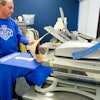WASHINGTON (AP) -- Some employers are pressuring workers not to report illnesses and injuries, just one problem that has led to widespread underreporting of workplace safety issues, according to congressional investigators.
Occupational Safety and Health Administration inspectors often didn't interview workers to verify what employers claim when keeping tabs on accident and illness rates, the Government Accountability Office report released Monday states.
The report said workplace injuries and illnesses went unreported because companies pressured employees to withhold the information, and about a third of health providers said they were pressured to withhold medical treatment so companies could avoid filing reports with OSHA.
The GAO report said OSHA could catch some of the underreporting by properly auditing employer records and not relying solely on employer data.
Labor Secretary Hilda Solis said Monday she will move swiftly to correct the problems highlighted in the GAO report.
"Many of the problems identified in the report are quite alarming and OSHA will be taking strong enforcement action where we find underreporting," Solis said.
Democratic lawmakers requested the GAO report because they are skeptical of numbers that have shown the rate of workplace injuries and illnesses declining between 1992 and 2007.
The GAO did not determine that those numbers are flawed, but concluded that OSHA could get more accurate information if inspectors did a better job independently verifying the data employers provide.
Part of the problem is that OSHA officials don't audit records until two years after incidents occur. That often means the workers involved in the incidents are no longer available to be interviewed.
In its survey of occupational health workers, GAO also found more than half said they felt pressure from company officials to downplay serious injuries or illnesses. About two-thirds said they knew of workers who feared disciplinary action just for reporting an injury or illness.
Washington Sen. Patty Murray, chairwoman of the Senate subcommittee on Employment and Workplace Safety, said the report confirms "we can't just take employers at their word" when it comes to documenting workplace injuries.
"The system to this point has been all too easy to game," Murray said.
In 2007, there were about 4 million cases in which workers were injured or became ill as a result of unsafe or unhealthy working conditions. OSHA inspects work sites in industries that typically have the highest number of workplace injuries, such as the transportation and chemical industries.
But the report also found that OSHA does not audit records in eight other "high hazard" industries -- including amusement parks and ski facilities -- because it has not updated agency regulations. The report urged OSHA to revise its regulations to include those industries.
OSHA agreed with all the recommendations in the GAO report. Earlier this year, OSHA launched a new program that would increase the number of work sites audited to check the accuracy of injury and illness reports.






















